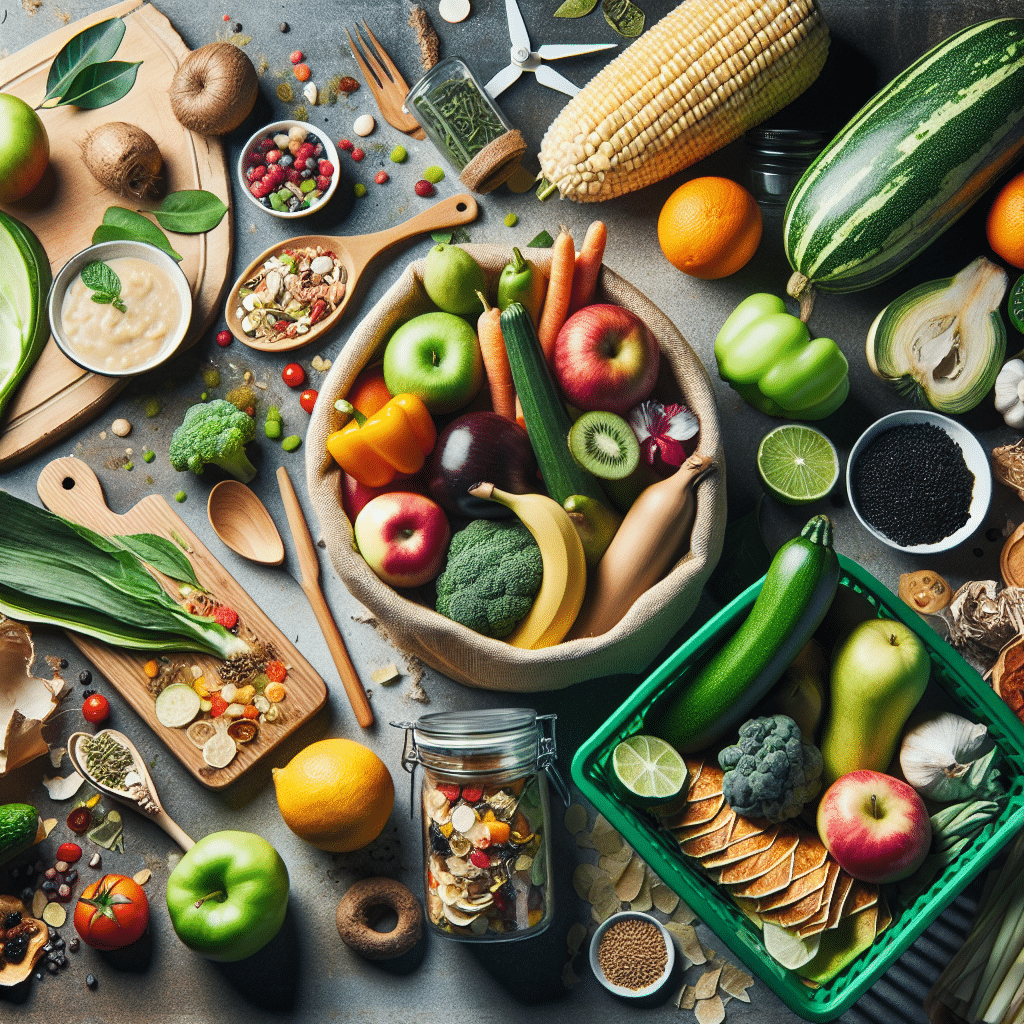The Ultimate Guide to Vegan Sustainable Eating How to Make a Positive Impact on the Planet

Switching to a vegan sustainable diet is a powerful way to help the environment and improve your health. By choosing plant-based foods, you can reduce your environmental impact, enjoy numerous health benefits, and support a more sustainable future for everyone. This article explores the many advantages of vegan sustainable eating and offers tips on how to make the transition smoothly.
Key Takeaways
- Vegan sustainable eating helps reduce greenhouse gas emissions and lowers your carbon footprint.
- Plant-based diets contribute to better health by reducing the risk of chronic diseases such as heart disease and diabetes.
- Transitioning to a vegan diet can be made easier with simple swaps and proper meal planning.
- Embracing a zero-waste lifestyle complements vegan eating by minimizing food waste and promoting eco-friendly practices.
- Joining vegan communities and supporting local farmers can enhance your sustainable eating journey.
Understanding Vegan Sustainable Eating
What is Vegan Sustainable Eating?
Vegan sustainable eating is all about choosing plant-based foods that are good for both you and the planet. It means eating in a way that reduces harm to the environment and promotes health. By focusing on plants, you can help cut down on pollution and save resources like water and land.
The Environmental Impact of Animal Agriculture
Animal farming uses a lot of resources and creates a lot of waste. Raising animals for food takes up more land, water, and energy than growing plants. Plus, animals produce methane, a gas that harms the atmosphere. Switching to a vegan diet can help reduce these negative effects.
How Plant-Based Diets Contribute to Sustainability
Eating a plant-based diet helps the environment in many ways. Plants need fewer resources to grow and don't produce waste like animals do. By choosing vegan foods, you can lower your carbon footprint and support a healthier planet.
Embracing vegan sustainable eating is a powerful way to make a positive impact on the environment and your health.
Health Benefits of Vegan Sustainable Eating
Boosting Your Immune System with Plant-Based Foods
Eating a vegan diet can help strengthen your immune system. Plant-based foods are rich in vitamins, minerals, and antioxidants that support overall health. Fruits and vegetables are packed with nutrients that can help your body fight off illnesses and infections.
Weight Management and Vegan Diets
Switching to a vegan diet can be a great way to manage your weight. Plant-based foods are generally lower in calories and higher in fiber, which can help you feel full longer. This can make it easier to maintain a healthy weight without feeling deprived.
Reducing the Risk of Chronic Diseases
A vegan diet can lower your risk of developing chronic diseases. Studies have shown that a plant-based diet can reduce the risk of heart disease, high blood pressure, diabetes, and certain types of cancer. This is because vegan diets are typically lower in saturated fats and cholesterol, and higher in fiber and antioxidants.
Embracing a vegan diet is not just about avoiding animal products; it's about choosing foods that nourish your body and support long-term health.
By focusing on whole, plant-based foods, you can enjoy a variety of health benefits while also making a positive impact on the planet.
Practical Tips for Transitioning to a Vegan Sustainable Diet
Simple Swaps to Get Started
Transitioning to a vegan diet doesn't have to be overwhelming. Start by making simple swaps in your daily meals. For example, replace cow's milk with almond or oat milk, and use beans or lentils instead of meat in your favorite recipes. These small changes can make a big difference and help you get used to vegan eating without feeling deprived.
Meal Planning for a Vegan Lifestyle
Planning your meals ahead of time is crucial for a successful transition. Make sure you have a good supply of vegan-friendly foods on hand. Consider meal prepping to save time and reduce food waste. By preparing meals in advance, you can ensure you have healthy, plant-based options ready to go, which can help you stick to your new diet.
Navigating Social Situations as a Vegan
Social situations can be tricky when you're new to veganism. It's important to communicate your dietary choices to friends and family. Don't be afraid to bring your own vegan dishes to gatherings or suggest restaurants with vegan options. Remember, it's okay to take things at your own pace and make adjustments as needed.
Embracing a vegan lifestyle is a journey, not a race. Take it one step at a time and celebrate your progress along the way.
Embracing a Zero Waste Lifestyle
Reducing Food Waste in a Vegan Diet
Reducing food waste is a key part of a zero waste lifestyle. Start by planning your meals and buying only what you need. This way, you can avoid throwing away spoiled food. Meal prepping can also help you use up ingredients before they go bad. Another tip is to get creative with leftovers. Turn yesterday's dinner into today's lunch!
Eco-Friendly Food Storage Solutions
Storing food properly can make a big difference. Use reusable containers instead of single-use plastic bags. Glass jars are great for storing dry goods like rice and beans. Beeswax wraps are a fantastic alternative to plastic wrap. They keep your food fresh and are reusable. Don't forget to label your containers with the date so you know when to use them.
Composting and Recycling Tips
Composting is a great way to reduce waste and create nutrient-rich soil for your garden. You can compost fruit and veggie scraps, coffee grounds, and even eggshells. If you don't have a garden, look for community composting programs. Recycling is also important. Make sure to rinse out containers and sort your recyclables properly. Every small action helps reduce waste and protect the planet.
Embracing a zero waste lifestyle is a powerful way to contribute to a healthier planet. By making conscious choices to reduce waste, we can create a significant positive change.
Community and Social Aspects of Vegan Sustainable Eating
Joining Vegan Communities
One of the best ways to stay motivated and inspired on your vegan journey is by joining vegan communities. These groups offer support, share recipes, and provide a sense of belonging. Feeling part of a greater community can make the transition to a vegan lifestyle much easier and more enjoyable. You can find local meetups, online forums, and social media groups dedicated to veganism.
Supporting Local Farmers and Markets
Buying from local farmers and markets not only supports your community but also ensures you get fresh, seasonal produce. This practice reduces the carbon footprint associated with transporting food over long distances. Plus, it fosters a connection between you and the people who grow your food, making your eating habits more sustainable.
Educational Resources and Workshops
There are numerous educational resources and workshops available for those interested in vegan sustainable eating. These can range from cooking classes to gardening workshops, all aimed at helping you make informed and eco-conscious food choices. Participating in these activities can deepen your understanding of how a plant-based diet contributes to ecological stewardship.
Embracing vegan sustainable eating is not just about changing your diet; it's about building connections and learning together to make a positive impact on the planet.
Exploring the Future of Vegan Sustainable Eating
Innovations in Plant-Based Foods
The future of vegan sustainable eating is bright, thanks to innovations in plant-based foods. Companies are developing new products that mimic the taste and texture of meat, dairy, and eggs without the environmental impact. Imagine enjoying a burger that tastes just like beef but is made entirely from plants! These advancements are making it easier for people to switch to a vegan diet without feeling like they're missing out.
The Role of Technology in Sustainable Eating
Technology is playing a huge role in making sustainable eating more accessible. From apps that help you find vegan restaurants to gadgets that make cooking plant-based meals a breeze, tech is here to help. There are even lab-grown meats and 3D-printed foods on the horizon, which could revolutionize the way we think about food production and consumption.
Global Movements and Trends
Around the world, more people are embracing veganism as a way to reduce their carbon footprint and promote eco-friendly living. This global movement is supported by various trends, such as Meatless Mondays and Veganuary, which encourage people to try veganism for a short period. These initiatives are helping to raise awareness about the benefits of a plant-based diet and making it more mainstream.
The future of vegan sustainable eating is not just about individual choices but also about collective action. By embracing these innovations and trends, we can make a significant positive impact on the planet.
Mindfulness and Ethical Considerations
Mindful Eating Practices
Mindful eating is about being fully present during meals. It means paying attention to the taste, texture, and aroma of your food. This practice can help you appreciate your meals more and make healthier choices. Being mindful can also reduce overeating and improve digestion.
Ethical Reasons for Choosing Veganism
Many people choose veganism for ethical reasons. They believe in compassion for all living beings and want to avoid contributing to animal suffering. Veganism also supports environmental sustainability by reducing the demand for animal agriculture, which is a major source of pollution and resource depletion.
Connecting with Nature Through Food Choices
Choosing plant-based foods can help you feel more connected to nature. When you eat fruits and vegetables, you are consuming foods that come directly from the earth. This connection can inspire you to make more sustainable choices in other areas of your life, like embracing sustainable cooking and preserving techniques.
Conclusion
Switching to a vegan sustainable diet is a fantastic way to help the planet and improve your health. By choosing plant-based foods, you can lower your carbon footprint and support a more eco-friendly lifestyle. It's not just about what you eat, but how you live. From reducing waste to supporting local farmers, every small step counts. Remember, it's okay to start slow and make gradual changes. Every effort you make contributes to a healthier planet. So, let's embrace vegan sustainable eating and make a positive impact together!
Frequently Asked Questions
What is vegan sustainable eating?
Vegan sustainable eating means choosing plant-based foods that are grown and produced in ways that are good for the environment. This includes eating fruits, vegetables, grains, and nuts while avoiding animal products.
How does vegan eating help the environment?
Eating vegan helps the environment by reducing the need for animal farming, which uses a lot of land, water, and energy. It also cuts down on greenhouse gas emissions and helps preserve forests and other natural habitats.
Can a vegan diet provide all the nutrients I need?
Yes, a vegan diet can give you all the nutrients you need if you eat a variety of foods. You can get protein from beans, lentils, and tofu, and vitamins from fruits and veggies. Sometimes, people take supplements like vitamin B12 to make sure they get everything they need.
Is it expensive to eat a vegan sustainable diet?
Eating a vegan sustainable diet doesn't have to be expensive. Many plant-based foods like beans, rice, and seasonal vegetables are quite affordable. Planning your meals and buying in bulk can also help keep costs down.
How can I start eating vegan sustainably?
You can start by making small changes like swapping meat for beans or tofu in your meals. Try to buy locally grown and organic foods when you can. There are lots of recipes and resources online to help you get started.
What are some tips for eating vegan in social situations?
In social situations, you can let your friends and family know about your dietary choices ahead of time. Bring a vegan dish to share, and look for restaurants that offer vegan options. Don't be afraid to ask questions about how food is prepared.

